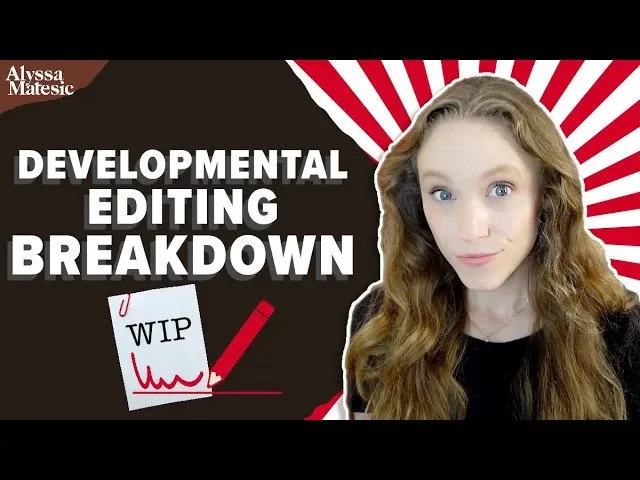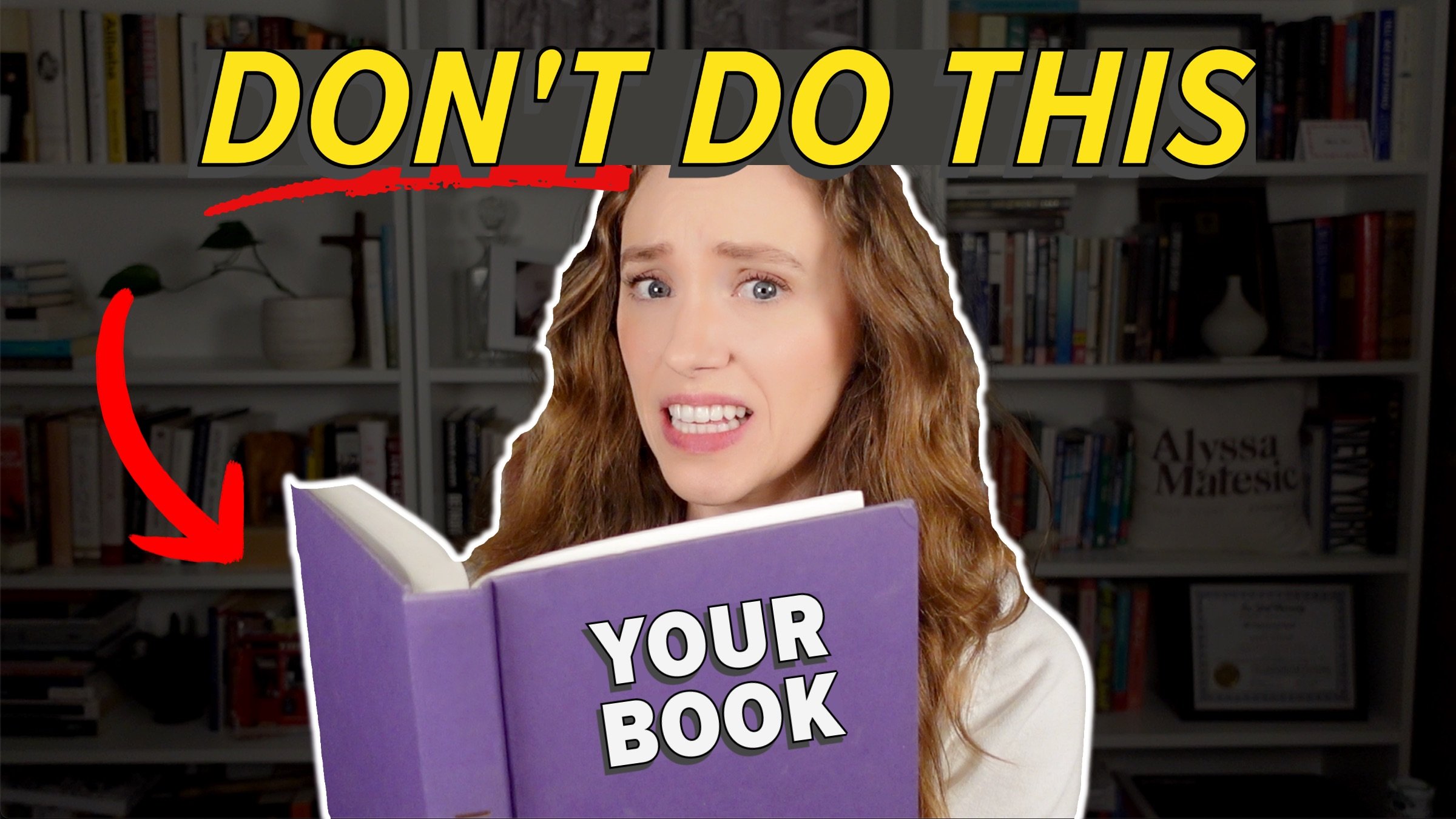What Is a Developmental Edit, and Why Do You Need One?
HIT PLAY OR READ THE POST BELOW:
If you're thinking of working with a book editor to make your manuscript stronger, you've likely come across the term developmental editing. But what is a developmental edit, and do you really need it?
Most authors are familiar with the terms copy editing and proofreading when it comes to editing a manuscript, but developmental editing might be a term you haven't encountered before. But developmental editing is truly a necessary part of the revision process to make your story as strong as it can possibly be. A successful developmental edit can take your story to new heights, and skipping the developmental editing phase can be a huge disservice to your story — and, in the worst case, result in readers not engaging with your story in the way that you intend for them to.
Today I'm going to explain what developmental editing truly entails, what you can expect if you go through a developmental edit, and why every author needs to go through a developmental edit to allow your book to reach its fullest potential.
First, a little bit about me: I'm a professional developmental book editor. I worked in the traditional publishing industry at a high-profile literary agency and an imprint of Penguin Random House. Now, I work with authors independently on developmental editing.
What Is a Developmental Edit?
There are multiple terms used in the book industry for a developmental edit. So, while developmental editing is the most common phrasing, you might also hear it referred to as:
Comprehensive editing
Substantive editing
Conceptual editing
Structural editing
Ultimately, developmental editing focuses on big-picture elements of your story and helps you ensure that all the main pillars of your story are holding up. We're not so concerned with smaller issues, like grammar issues and typos, at this stage of editing — we're thinking about the story holistically and what is going to make it engage a reader from beginning to end. It's typically the first editing phase that your manuscript should undergo because it is most efficient for you to work through all of those big issues before drilling down into line-level issues like grammatical errors or typos.
What’s Included in a Developmental Edit?
In a developmental edit, some specific things that your editor will comment on and offer suggestions for include:
Pacing — does the story move forward swiftly, or are there any areas that drag? Should certain scenes or subplots be removed to keep the reader more engaged?
Character development — are your characters believable? Do they feel authentic? Are they intriguing? Do they transform in some meaningful way over the course of the story?
Structure — does the structure of the narrative make sense for this particular story, whether it's a linear and chronological narrative or a dual timeline?
Point of view — whether it's written in close third person or first-person narration, is the POV consistent throughout the entire manuscript, and is it well-executed?
Plotting — does the plot make sense and hold up logically, or are there a lot of plot holes that are distracting? Do all of the twists and reveals and turns in the plot hold up and feel justified?
Themes — is your overall message coming through to the reader? Does it feel earned by the end of the story? Does it make sense threaded throughout the entire narrative?
Tone and voice — is the tone appropriate for your age category and genre? Is the narrative voice engaging, or does it turn the reader off? Do the tone and voice feel authoritative?
Length — is the length appropriate for your age category and genre, or does the manuscript need to be longer or shorter to suit the reader's expectations? How can we make it longer or shorter if that's the case?
I know that seems like a ton, but that's just a taste of what a developmental edit entails. Ultimately, a developmental edit is going to evaluate all the facets of your story and help you see which areas need further refining to truly make the story the best version of itself.
Forms of Developmental Editing
When you work with an editor on developmental edit, it could come in several different forms:
An Editorial Assessment
The first form would be an editorial assessment, which is also called a manuscript critique or an editorial letter. This is a separate document that is essentially a report on all your main story elements.
The editor will write up their evaluation of the story and give you specific recommendations on how to implement changes that would make those areas even stronger. Personally, when I work with anyone in a developmental editing capacity, this is the first phase I require us to go through because I want to address all those big-picture, overarching elements before we dive into specific scenes in the manuscript itself.
in-line developmental editing
That brings me to the second primary form of a developmental edit, which would be comments in your manuscript draft itself. You would receive a copy of your manuscript with little bubbles in the side margins where the editor is making commentary. In those comments, the editor isn't focusing so much on spelling or grammatical issues; they're asking questions about the scene and the placement of scenes, about how a character is being portrayed — things like that.
A developmental edit in the form of these manuscript comments is going to help you improve the flow of the narrative, scene by scene, and help you ensure each scene is doing the work it needs to and ultimately contributing something to the overarching story.
A Combined Editorial Assessment and developmental edit
Some editors will also offer a combination of inline comments in your manuscript draft in addition to a separate editorial assessment-style document.
Why You Need a Developmental Edit
A developmental edit is truly necessary for you to achieve your story's potential. This is a great step to take if you're at a point with your manuscript where you can't see the forest from the trees. When you're not sure what's wrong with it, it can be really helpful to do get professional-level feedback. Here’s why:
1. It Helps You Realize Your Vision
Your editor's primary concern is making sure that the overall message, theme, and the reader experience that you want them to have are working as intended in the manuscript.
Too often, there are issues in the draft that you can't see because you're too close to it that are actually preventing the reader from having the experience that you want them to. That's where a developmental editor who understands your vision will come in and help you implement that vision in the manuscript. Frankly, you're probably too close to the story at this point to be able to see those issues for yourself.
Some authors who are newer in their career have the misconception that an editor is going to come in, hack up your story and make it whatever they want it to be, but that is absolutely not the mindset that an editor should take. A good editor is only concerned with your intentions for the book and your vision for it. They understand that it is not their story by any stretch of the imagination, but yours and yours alone. They are only interested in helping you achieve what you want to do with this story.
This is the reason why I personally find being a developmental editor so rewarding; there is nothing like helping an author achieve their dreams with their story, seeing their vision for it realized, and allowing them to feel that sense of pride and accomplishment. That is the goal of a developmental edit.
2. It Transforms Your Book for the Better
Your developmental editor is your partner in elevating your story, and in many ways, they act like your personal trainer or coach.
I'm not going to sugarcoat it; implementing the revisions suggested in a developmental edit is a ton of work on you as the author. It can take weeks or months to work through all your editor’s suggestions, and it might take a lot of heavy lifting in terms of transforming the manuscript from what it is now. But, at the end of all of that work, I promise that you're going to have a story that is so much more compelling, emotionally resonant, and engaging from beginning to end. Your book might end up looking very different after the developmental edit than what it was at first, and that's kind of the point. So don't shy away from that work!
I like to personally think of developmental editing like molding a slab of wet clay. You might have an idea of what you want the shape to be, but it can still be molded and refined and transformed, even into something else entirely — something better, something more beautiful, something that maybe you didn't even realize was possible to create.
The best part of developmental editing is that it's not only going to help you improve this particular story that you love, but every other story from here on out. You can apply all of the feedback you got from your editor on this draft to all your future books, and you're ultimately going to be a stronger writer because of it.
3. It Improves Your Publishing Success
The final reason why a developmental edit is essential for any serious author is that it increases your chances of success in publishing. Whether you're planning to self-publish or pursue traditional publishing, it's imperative that your manuscript is as strong as you can possibly make it before you go into the publishing process. After all, you want to put the best version of the story out there for readers.
With self-publishing, you want your book to be on par with books that are published through a publishing house in terms of quality, which will require investing in multiple levels of editing — not just copy editing and proofreading to make sure each sentence flows, but also developmental editing to make sure all the overarching story elements are working.
For traditional publishing, it's not necessary to work with a professional developmental editor prior to querying, and plenty of authors get representation without working with a professional editor. That said, given how competitive traditional publishing is, some authors want that level of support and want to make the investment in a professional developmental edit before querying. That helps them ensure that they're putting their best foot forward and the best version of the story in front of literary agents.
It's also worth noting that in traditional publishing, it is likely you are still going to go through some developmental work with your agent as well as with your editor at your publishing house, even if you've done some developmental editing already. It's not really a one-and-done deal; you can do many rounds of developmental editing. Again, it helps to think of your manuscript not as something that is done after one round of editing, but something that can be continually improved.
I hope this helped you understand what developmental editing is and why it is so important. Thanks so much for reading and happy writing!






